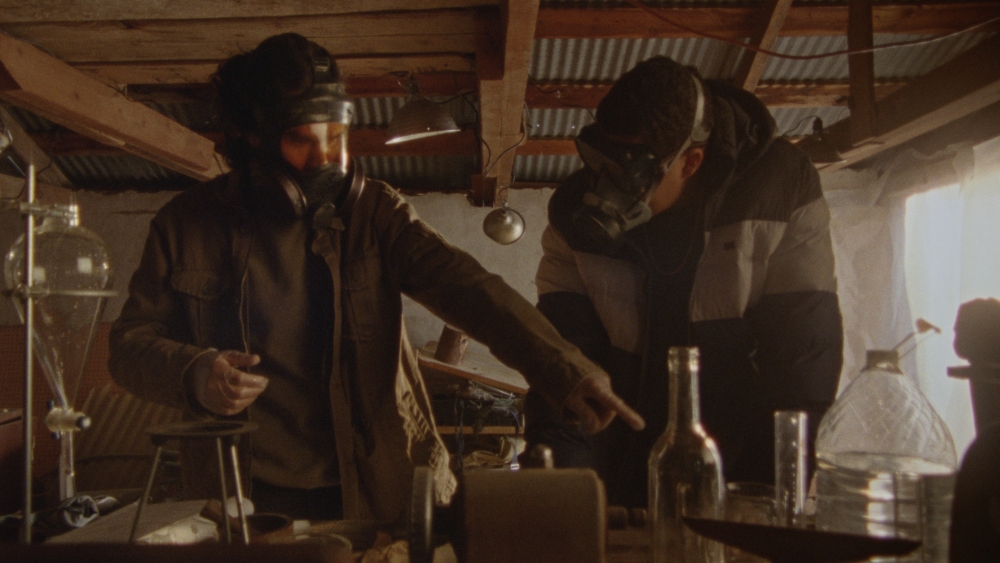
Even among many who’ve grasped the scientific evidence, or experienced escalating weather extremes, climate change remains an abstraction for most — something too large and vague to trigger urgent emotional response. Not so the fictive activists in “How to Blow Up a Pipeline,” inspired by Andreas Malm’s nonfiction tome of the same name. Though diverse in background and motivations, the eight individuals here drawn together to attack an oil conduit in Texas share a sense that the planetary environmental crisis is immediate, and the time for gently chiding protests past.
Whether their actions constitute “eco-terrorism” and whether violence of any kind is ever justifiable in the service of progress are questions Daniel Goldhaber’s sophomore feature duly grapples with. Still, its degree of moral self-examination is unlikely to appease climate deniers, who’ll likely decry the film (if they notice it at all) as a recruitment poster for aspiring saboteurs. It’s more nuanced than that, but this strong, straightforward drama-cum-thriller about a divisive topic will nonetheless primarily appeal to viewers on the left side of the political dial. Neon is releasing to U.S. theaters on April 7.
An opening sequence introduces us in brief to the geographically scattered protagonists, mostly working-class twenty- and thirtysomethings. We soon realize these strangers have already organized long-distance into a team, covertly planning an act of industrial destruction for which they now meet in a remote, abandoned homestead. Their target: a West Texas oil pipeline recently constructed despite all objections from affected residents and environmental watchdogs.
The rest of the film intersperses present-tense narrative with chaptered glimpses of individual backstories. Theo (Ariela Barer) has found out she has a rare, terminal leukemia contracted from growing up in a refinery town’s toxic atmosphere. Her joining this band is enthusiastically supported by best friend Xochitl (Arila Barer), more reluctantly by lover Alisha (Jayme Lawson). Dwayne (Jack Weary) is a taciturn rural Texan furious that the government appropriated property his family owned for a century in order to build the pipeline, robbing him and his pregnant wife of their home.
Native American Michael (Forrest Goodluck) rages in general at the continual violation of tribal land rights, choosing this course of protest partly to rebel against his mother’s (Irene Bedard) pacifist activism. Shawn (Marcus Scribner) thought to make a difference by working on a documentary about environmentalist radicals, then decided he’d rather join their ranks outright. The least sympathetic, most caricatured figures here are white heterosexual couple Rowan (Kristine Froseth) and Logan (Lukas Gage), who seem such irresponsible party animals we can’t quite believe the others accept them into their secretive circle.
Still, even those two are granted more dimensionality as the story provides later twists and turns. The methodologies of tactics (Michael’s bomb construction, eventual difficulties in placing the incendiary and keeping authorities at a safe distance) are credibly worked out, and credibly fallible — after all, these people aren’t criminal masterminds.
When the zero hour arrives, required tasks get accomplished amid ample suspense that arises both from the risk of arrest and their own potential for error. Knowing their act will hurt ordinary citizens (by disrupting supply, thereby temporarily spiking oil prices), they rationalize that cost in the hopes it will send a powerful message to fossil-fuel advocates. The message being that fundamental systemic change is necessary to avoid (or even just soften) a catastrophic future for humanity — and refusal will only bring more asset-damaging subterfuge.
Like the somewhat controversial book published just two years ago, this screen “Pipeline” is much less the billed “how-to” than a “why,” pondering the reasons that lead some to risk physical harm or incarceration in service of a cause certain climate scientists worry we may have already lost. It definitely helps that the actors eschew any flamboyant turns for a naturalism that makes this motley crew seem plausible enough.
While it may feel less so that these characters escape at least some anticipated consequences, “Pipeline” nonetheless evades lending them excessive heroic glamour. Goldhaber’s terse, non-hyperbolic, almost quasi-documentary tenor complements a script (co-written with cast member Barer and executive producer Jordan Sjol) that manages to balance character drama, thriller aspects and discussion of the larger ethical issues that’s well-integrated enough to avoid didacticism.
In contrast to the director’s prior feature “Cam,” an intriguing 2018 mystery about an online erotic performer’s identity theft, “Pipeline” has a fuss-free aesthetic that seldom draws attention to itself. Tehillah De Castro’s cinematography favors unshowy compositions and a measure of hand-held movement. Editor Daniel Garber maintains a taut pace that, like the action itself, stops short of standard caper/espionage genre knife-twisting. Gavin Brivik’s original score ratchets up the tension as needed with unmemorable but efficient pulsing electronica. Credited as “Technical Advisor” is “Anonymous”—presumably not the hacktivist group of that name, but you do get the sense that somebody consulted here really knows the practical details of what goes into an attack of the type depicted.











